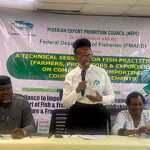Yield10 CEO Oliver Peoples makes case for camelina as fish oil alternative

Oliver Peoples is the president and CEO of Yield10 Bioscience, which is developing Camelina sativa as a sustainable platform crop to produce feedstock oil for omega-3 oil. The company recently won approval from the U.S. Department of Agriculture Animal and Plant Health Inspection Service (USDA-APHIS) to grown and breed its stacked herbicide tolerant camelina in the U.S. The Woburn, Massachusetts, U.S.A-based company signed a letter of intent in November 2023 with Aarhus, Denmark-based aquafeed firm BioMar to commercialize a fish oil alternative derived from camelina.
SeafoodSource: Many different companies – Calysta, NovoNutrients, Corbion, KnipBio, ADM, Unibio, NuSeed, Veramaris, Houdek, and Aquaterra, to name a few – are trying different solutions to create omega-3 additives as a replacement for marine products used in fishmeal and fish oil. Why is yours better than theirs?
Peoples: First of all, there's no ocean harvesting solution to this, because you're harvesting a resource out of the ocean that’s finite and, in fact, dwindling. Yet demand for omega-3s and demand for high-quality protein like farmed salmon continues to grow. In fact, probably one of the main constraints on the industry, other than regulations and a need to transition over to closed-loop recycled-water aquaculture, is a supply of the right ingredients at a cost that makes sense. So the industry is trapped.
Camelina is a sustainable solution that we have to scale up and commercialize as a way to solve the bottleneck. Our big focus on camelina today is to make a low-carbon impact feedstock oil and biofuel. The one thing it has to be is cost-effective and we've been building the camelina platform with that in mind.
And I think the main thing is if you look at the space and you look at algal systems versus the camelina, based on the quality of the product and the cost structure, camelina is going to win. It’s just that simple. It doesn't mean there's no room for all those other systems, it just means they're probably not going to be able to expand, because the cost differential is going to basically be too problematic.
SeafoodSource: Can you expand on that? Why is there such a large cost differential between camelina and Yield10’s competitors in the sector?
Peoples: If you look at the algal systems, and I'm very familiar with fermentation technology – I have a deep background in that and I have the scars to prove it – their processes are pretty inefficient. Corbion’s requires a lot of energy and spews a lot of CO2 back out into the atmosphere. In Veramaris’ case, their dedicated facility cost around USD 200 million (EUR 185.8 million). If the industry is trying to grow between 3 and 6 percent per year, that means we’ll need 20,000 to 30,000 tons of additional fish oil, so every year you’ve got to spend another USD 200 million building a facility. That gets expensive very quickly, and those facilities have high operating costs.
For us, we will …
Photo courtesy of Yield10





Share